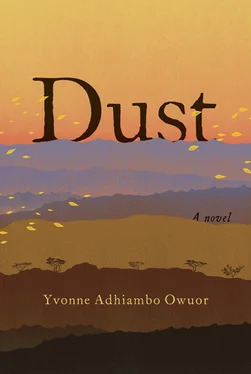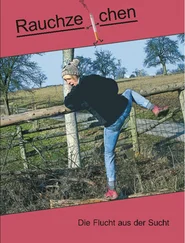They approach the house and discover two things:
Akai-ma has not come home.
Odidi has not returned from the dead.
“Par Oganda odong nono.…” Nyipir hums to an emptiness that stretches even further out.
“Baba,” Ajany groans.
Par Oganda odong nono .…
“Why d-did my brother die?”
Nyipir halts. Then a staccato answer: “Police.” Let it suffice .
But he speaks to dark-violet skies. “I begged them, knelt down. Searched for him. Begged them to save my child.”
Ajany would now haul back every question if she could. Bulldoze guilt, shame, and the loneliness made out of a father crying out for his son’s return. Sorrow is admitting to a mother’s loathing for one’s existence. Terror is the knowledge that a persistent phone call could have saved an only brother’s life. Horror is a vision of blood on her hands. Powerlessness is hearing a father’s deep voice become a wail. One question crosses wires with another so that from out of her memory a deliberately suppressed phantom now bounds into Wuoth Ogik.
It is a musician from Salvador de Bahia, and his spectre looms in her mind, and plunders her soul again. What had she done? The echo of a howl, the vision of blood spurting from a jagged wound on the same date as that which was scrawled on a brother’s death certificate. In seeing, inside Ajany, something at last detonates.
There is a minuscule space into which sanity may slip without turning into chaos, an intimate line that should not be crossed by unbearable memory. At last, she is stumbling down cliffs. Mind is black, body melts into massive silent waterfalls that cascade into endless chasms, falling and falling. Her spirit whispers to her soul that Ajany is now dead.

Isaiah had paused outside the house to watch the coral tints that darkened as the light’s mood shifted. Colored tiles, mostly brown. Walls of termite-mound soil, wood mixed with crushed coral. He had wandered into the house and strolled through its two levels. He lay on the floor, the better to appreciate the high roof that nestled on broad, rough wooden beams. He imagined that the style was a paring down of a Kenyan bush aesthetic — made of a palette of colors from the stark landscape. There were glimpses of outside vastness wherever he stood, startling portals designed to sneak the landscape in. He had shut his eyes before one such entryway, and four shrieking winds emerged in a resonant cascade. The house paid homage to water.
Now a fly weaves in between fault-lined pillars. Isaiah’s eyes follow the insect as it navigates wall fissures that start at the base of the house and disappear into eaves. The house creaks. Musk of neglect, and something else — as if the inhabitants whose memories drenched the walls had lived their lives within the house, but not in the house, and the house had never participated in the ebb and flow of their existence.
Isaiah finds a place for himself in the library, to which he has been directed. He stops before the shelf filled with his father’s books. He turns, sits on a dust-dotted sisal mat, and draws up his knees. He invokes his mother, Selene. I’m here .
Nobody sees his tears.
Later, he would browse through book pages, count the number of times Hugh Bolton was written into the first leaf: sixty-one. Trace squiggles in margins, mountains, water, trees, and stick figures, feeling for messages, imagining warmth. He has brought books to his nose and thought he detected a whiff of old cigar smoke. Brushing fingers on black fountain-pen strokes, lingering on a twisted old-fashioned “g,” imagining that he was touching his father’s hand.
OUTSIDE, DAY BECOMES NIGHT. INSIDE HER DREAMING, ODIDI and Ajany run from the red cave and its skeleton that oozes resentment. They scamper over large black, red, and brown rocks and spill over spidery, sandy trails, a camel track. Tear through small thornbushes that grab at and leave blood stripes on their bodies, cross a damp laga , past a Morengo and Mareer tree, through an abandoned cattle boma , and crash into flowering acacia thickets, from where they can hear Kalacha springs murmur, the prattle of buffalo weavers and golden pipits.
The shadow of Wuoth Ogik.
Line of blood on Odidi’s face.
Ajany spits on her hands and wipes Odidi’s forehead where blood has clotted. Odidi winces. “Sorry, Odi.”
He pulls at her hair. “Is it showing?”
Ajany nods. “Sorry, Odi.”
“We say a wait-a-bit branch got me, OK?”
Ajany asks, “We pray?”
Odidi pinches her arm. “Silly!”
She sobs, “Where’s Obarogo’s face?”
Odidi’s fingers nip her upper arm. “Shhh.”
A falsetto trill seduces cows and camels to water. Water songs.
“Sprinkled life
Unshackle journeys ,
Respite. Rest .
Drink-Drink, flat-footed, sand-dreamer.…”
The two children wait for after dusk, when lanterns are lit. They tremble with the wind. The night is as jumpy as they are.
Odidi’s voice is slow and solemn: “Never, never, never shall we talk about this, never to remember the cave. We forget, and if we tell, the earth must gobble us up. Swear?”
Fear inserted itself between them.
It breathed.
It was in Odidi’s hiss, “You must swear .” Grabbing earth: “Hold this soil.”
The oath inflamed Ajany’s little throat, and she choked.
“Why m-me?”
“ ’Cause you’re a cry-dudu-water-mouth silly.”
“Not.”
“You scare easy.”
“Don’t.”
“So?”
With watery eyes, Ajany ground out the words “I swear,” clinging to the dirt, and something elemental inside her flowed away, just like the soil she held in her hands.
The woman glided toward the gate. Her AK-47 pointing downward. Not threat — vigilance. A sunset silhouette. Akai-ma. Baba was not home.
Two pairs of eyes followed Akai-ma as she inspected the patterns of the land, looking for something.
Ajany clutched her brother.
Her stammer worsened in Akai’s presence: Akai-ma’s all-seeing eyes, a temper distilled into condensed, burning, tearing words with the impact of a curse.
“Odi, I’m afraid.”
Ajany felt herself to be a shadow that flickered at the edge of her mother’s gaze. It was rare for her mother to call her by her name. “That One!” Akai-ma might yell until Ajany emerged, already protecting herself from physical blows that were implied but never came.
Odidi said, “We go. I talk, you shut up.” Which was the normal way of things between them. “And stop shivering, idjut !”
Sniffle .
Odidi’s harsh whisper, “Silly dudu . Can’t take you Far Away if you cry. Such a baby.”
Ajany forced herself to let the crickets’ chirping fill her thoughts.
She wiped her face and sniffed twice more.
“OK,” Ajany said.
They crawled out of the bushes.
“I anger.”
Akai-ma’s English, pockmarked, dragged through moonscapes, propped up by gesture and hacked into low-droned present-tense portions into which any number of languages were inserted.
Akai: I anger you.
Though Odidi dared a quiet snigger, Ajany had long understood that Akai rendered words as they were made to be — soldier verbs, constructed for action and war. Ajany cowered in front of them.
Akai breathing in Ngaturkana: “Where did you go?” She would say, “Etch!” And spit a long distance away.
Every time Ajany practiced spitting, she would end up with great globs of saliva spattering her feet.
Читать дальше












